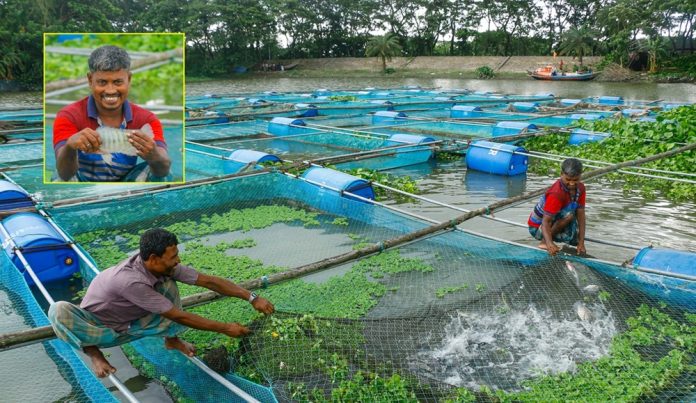Amir Hossain (43), a physically disabled rickshaw puller, is the husband of Nasrin Akter (33), a PPEPP-EU member from the Bhelumia union in the Bhola Sadar upazila. Amir has been the sole breadwinner of his six-member family, although Nasrin often assists him in cultivating crops on their small leased plot of land. Life had been harsh for them as they struggled to invest in and earn a living from their crops, making it difficult for Amir to support the family with his meagre income.
Amir and Nasrin had long sought opportunities to create multiple income sources for their extended family. However, they could not invest in their desired income-generating activities due to insufficient capital.
The PPEPP-EU project recognised their interests and potential, offering a livelihood option known as floating cage fish farming technology in the open water body. When the couple first learned about this income-generating activity, they were delighted that they did not need to lease a pond; instead, they could set up a fish farm in the river next to their home.
At first, Amir was uncertain about the profitability and time investment required. However, they did not have to look back after receiving the training on floating cage fish farming and a BDT 35000 grant to embark on their new income-generating activity.
Before initiating this enterprise, Amir received hands-on training and technical assistance in cage preparation, inputs (including fishery, fish feed, fertiliser, lime, probiotics and flocs), medication and floating cage management and started the farm with 1500 Tilapia and 500 Shorputi fish.
PPEPP-EU’s technical and assistant technical officers periodically advised them about fish farming. They connected Amir with local market players, such as wholesalers and retailers, enabling him to sell fish in the local market.
Having made a profit of BDT 18000 from their first sale after the 90-day production cycle, Amir and Nasrin were all smiles. Fish sales from Amir’s floating cage farm fetch him around BDT 20,000 on average in each three-month cycle.
Expressing gratitude to the PPEPP-EU project for helping them become self-sufficient, Nasrin remarked, ‘Once we struggled to manage daily meals; now we have savings too.’ Additionally, Amir has obtained his ‘Subarno Nagarik’ card (identification card for persons with disabilities) and receives a disability allowance, thanks to the advocacy efforts of PPEPP-EU.


